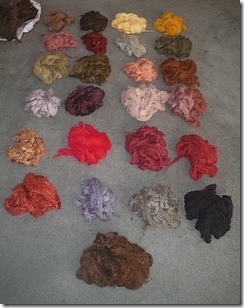 Call me a slow learner, but the aerial display of the fourth will have nothing on the fireworks tonight …
Call me a slow learner, but the aerial display of the fourth will have nothing on the fireworks tonight …
I Figure 26 colors run through the same sink, tracked across identical linoleum – each with a 100% chance of a gaily colored spill outlining big hammy footprints headed toward the Man Cave …
Naturally I’ll spring for roses and chocolate hoping to confuse Miss White Glove, but even with all the innocent looks and promises of romance her spider-sense is liable to tingle.
It’s why I save all those extra Fly Shop ziploc bags, the lecture on “How much fly tying stuff do you need” carries less penalty than the “you dribbled Olive crap all over the living room” variant. By witching hour, all two and a half pounds of dry fly dubbing, plus those sixteen animal hides will be packaged neatly, allowing me to look appropriately shamefaced while she administers the former – rather than the latter, while I distract her with dinner and a glass of fine red.
I was working colors mostly, a new set of dyes and a new vendor always requires an exhaustive trial to see how labels and reference colors stack up to the end result.
I use the “21” method for evaluating new dyes, as the range of payload color can be fairly drastic even among the lightest tints. Take two identical hanks of material, soak one in the bath for one minute – soak the other in the bath for twenty minutes, dry and compare.
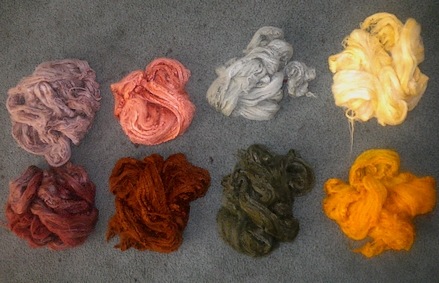
The upper row shows four colors dipped for just 60 seconds, the bottom row shows the same dye bath after 20 minutes. The rightmost “Maize Yellow” produced a Golden Amber with an extended dip – yet the label reference showed the light maize variant. The leftmost color was “Safari Gray” – a color similar to Khaki, but the extended dip became nearly brown.
The rust brown and dark olive (two middle colors) were labeled as the bottom row, both dark colors – and quite vibrant in intensity. The one minute colors yielded a sage green and a creamy orange – with the cream-orange a huge bonus as it’s used extensively in most of the watersheds I fish regular.
This is why it’s so important to test dyes before using them on precious materials, sometimes the reference color is one minute – other times it’s gained only after the long steep. Knowing which yields what minimizes mistakes and the unforeseen colors.
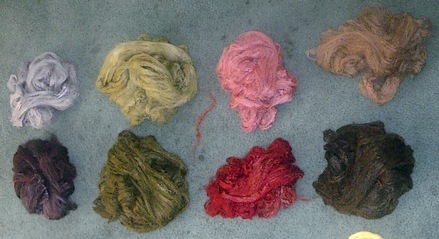
Here’s another four dyes with similar issues. The leftmost medium gray and rightmost khaki are only true to the label color after a one minute dip – after that they darken incredibly fast. The center two, medium olive and brick red match the label only after a twenty minute soak. The one minute olive is also a huge color, it’s the Pale Morning Dun pale olive – something I thought I’d have to craft, versus just dipping it in a jug of nymph dip for a minute.
Each of the dyes shown was measured identically, one tablespoon of dye and three tablespoons of fixative, each used identical amounts of water.
Each dye is capable of three distinctive colors, the 1, 20, and 11 minute shade.
A canny fellow looks at the colors available and the 1, 11, and 20 minute results and can exclude certain colors from purchase. Most browns have only minor adjustments in red or black pigment, having it steep longer will match a russet or dark brown which you won’t have to buy.
The above picture is 13 dyes yielding 25 colors – not to mention the most absolute black and bright red I’ve ever seen.
Get Out of Jail Free Card
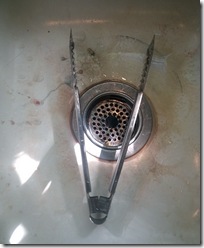 As no points are scored for being banned from the kitchen, it’s important that the how to make a complete mess is tempered with how to extricate yourself from a screaming and angry woman.
As no points are scored for being banned from the kitchen, it’s important that the how to make a complete mess is tempered with how to extricate yourself from a screaming and angry woman.
It’s like watching all those crime shows and getting pointers on how to hide the body.
At left is the corpse after three days of desiccation. “Her” corn grabbers being the blunt instrument we need to cleanse – as well as the assortment of ugly gray, red, and yellow driblets that line the strainer area. Each capable of bringing the Wrath of The Gods onto your narrow shoulders.
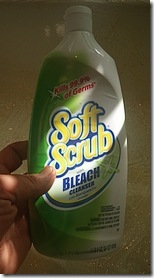 At right is the Righter of Kitchen Wrongs, cleanses fingerprints, restores the Pristine to the porcelain, and is capable of making you innocent of all imagined crimes.
At right is the Righter of Kitchen Wrongs, cleanses fingerprints, restores the Pristine to the porcelain, and is capable of making you innocent of all imagined crimes.
… and don’t nod your head like you knew it already, this is the Goods, Babe.
Lay a generous dollop onto the porcelain and cover the afflicted area completely, give it 10 minutes to work magic, then rinse.
… and don’t buy the lemon as it coagulates in the jug rendering the contents useless. Unless you like driving to the store – blowing through all them red lights.
Along with pink fingers, the immaculate sink is the only means of extending your dyeing career, providing enough cover to enjoy a second or third session …
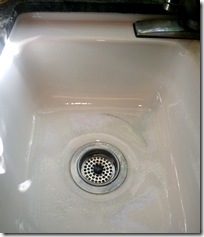
The pot scrape remains but all coloring agents are scoured from the surface. The shine has been restored as has the ability to see one’s reflection.
This corpse is buried deep.
Note the replaced strainer from my earliest attempts. All chrome with no tell tale rubber gasket to stain. It’s the perfect crime.
Tags: dyeing fly tying materials, dye reference colors, chrome strainer, dye stains, soft scrub, 21 method

You didn’t mention what dies you used. Was this on purpose? I am curios to know.
Sorry, I mentioned them in prior posts on the subject and omitted them here.
The above are largely Jacquard Acid Dyes. I’m using a mixture of Prochemical dyes and looking to add some missing colors available from Jacquard.
I get them from Dharma Trading Company:
http://www.dharmatrading.com/html/eng/1344-AA.shtml?lnav=dyes.html
Jacquard colors:
http://www.jacquardproducts.com/products/dyes/aciddye/colors.php
Pro Chemical:
https://www.prochemicalanddye.com/store/home.php